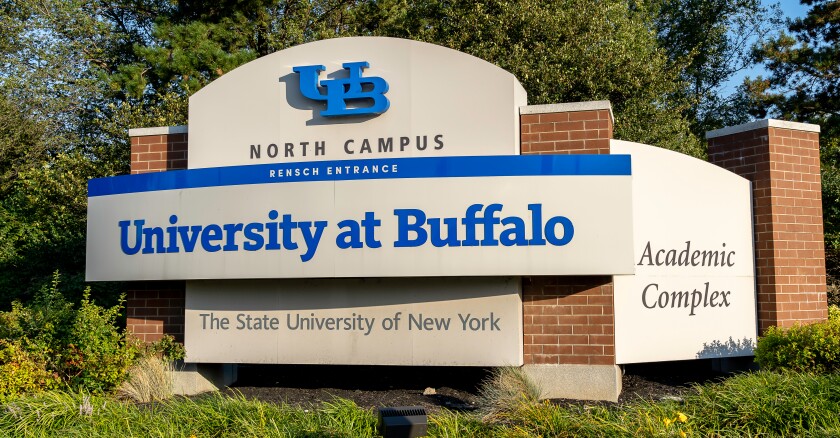A group of graduate students taking an online culminating project class at UB’s School of Public Health were facing potential academic sanctions from the school because Turnitin’s AI detection software flagged them for misconduct.
In at least one case, a student was told she wouldn’t be able to graduate until the matter was resolved, according to Kelsey Auman, one of the graduate students flagged by Turnitin who was under review for several weeks.
She started a petition on Change.org asking that UB disable the use of Turnitin and improve its appeals process to be more considerate of students’ rights. It has more than 1,100 signatures, including from some people claiming to be students or professors who have shared their bad experiences with the use of these kind of AI tools.
While many universities have found Turnitin to be an effective tool and continue to use it, some have chosen to disable it over concerns that it could lead to students being falsely accused of cheating. Vanderbilt, Michigan State, Northwestern and the University of Texas at Austin are among the schools that have stopped using it, according to a report from Bloomberg.
UB, which is aware of the petition but cannot directly address any specific student’s academic records due to privacy laws, says it does not rely solely on AI-detection software when adjudicating cases of alleged academic dishonesty. And when an instance of suspected academic dishonesty does arise, there’s a process in place for the review of each case, according to UB.
Auman said she has been cleared of any wrongdoing in this matter and her classmate who was being told her graduation could be delayed no longer faces that disciplinary action, but only after enduring stress and damaged reputations.
“We’re looking for jobs and going out into the real world so it can have serious consequences,” said Auman, who is studying to become a doctor and earn a master’s in public health at UB’s Jacobs School of Medicine. She is representing the group because the others are nervous to talk about this publicly.
“It causes stress when we’re just trying to graduate, and it can put you behind on a lot of other things, like being able to get a job, as you go through the process,” she added.
Turnitin remains a widely used tool for plagiarism detection in higher education, and many institutions still say they find it valuable in upholding academic integrity standards.
It allows instructors to choose whether to run student submissions through a program that checks for plagiarism and AI-generated work and can be used as a time-saving tool and to provide feedback to students.
“As AI becomes more prominent in everyday use, we need to be more vigilant in how our students are incorporating generative AI into their assignments,” according to UB’s website.
UB added that all software made available to instructors is “thoroughly vetted, monitored and regularly evaluated.”
“To ensure fairness, the university does not rely solely on AI-detection software when adjudicating cases of alleged academic dishonestly. To reach our standard of preponderance of evidence, instructors must have additional evidence that a student used AI in an unauthorized way,” the university said in a statement.
But schools like Vanderbilt decided against using Turnitin after reported instances of false accusations of AI usage being leveled against students at other universities and following their own investigation. That included using and testing it for several months, meeting with Turnitin and other AI leaders, and talking to other universities who also have access.
“I got accused of AI use last semester in my papers. They were 100 percent my work and because of all the time I had to try spending convincing my professor who wouldn’t believe me and on calls with academic integrity, I had to resign the course,” one student wrote on Change.org. “Now I have to take it over the summer to get enough credits for my scholarship. I emailed the rest of my class, and at least seven out of 24 people were also falsely accused of AI use.”
Auman was flagged for three assignments, dating back to February, but said she was not told about the issues until April. The culminating project class is the final master’s in public health requirement and is taken by graduate students in their final semester.
As it turns out, there were discrepancies over sourcing and citations in Auman’s work, she said. After the initial consultative meeting, she was able to send the professor her browser history to show the websites she had looked at to help shape her work.
“Anyone you talk to will tell you that graduate students typically don’t cheat, because if we cheat, we’re only hurting ourselves,” she said. “We’re going to have to do whatever the assignment is in the workplace anyway.”
Auman said Turnitin’s score was the only evidence with which she was presented while under review. If Turnitin detects above 40 percent of AI use in a student’s work, then it flags the assignment.
“It blindsided me,” Auman said. “I never experienced this before, so I didn’t expect it to happen now.”
She also said there’s a lack of checks and balances in the process. In some cases, appeal hearings were initially denied even after students provided strong evidence of doing their own work, she said. Additionally, there’s also a lack of consistency in how Turnitin is used by professors, Auman added.
UB says the review process includes a right for students to appeal and remediation for first-time offenders.
“I would love for UB to get rid of the technology, but I don’t think they are going to,” Auman said. “Some other schools have gotten rid of it. We don’t know enough about this technology. And they’re using AI to detect AI. What are we doing here?”
©2025 The Buffalo News (Buffalo, N.Y.). Distributed by Tribune Content Agency, LLC.















